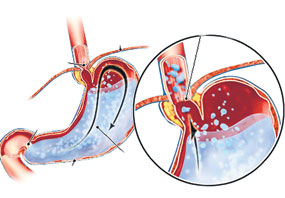
What’s burning inside?We may have all experienced at some time, a burning pain, just behind the breastbone. This is when the contents of the stomach flow back into the gullet (oesophagus), the muscular tube which takes food from the mouth to the stomach. Sometimes it comes up giving an acid taste or sourness in our mouths. For a significant number of people this 'heartburn' occurs so frequently (more than once or twice a week) that it becomes a problem even though you maybe otherwise healthy.
This is called 'gastro oesophageal reflux disease' or GORD'. We usually attribute all our upper gastrointestinal symptoms to gastritis. Indigestion, bloating, belching, heartburn are all put down to 'gastritis' and some people even think this is due to 'some gas formation in the stomach'. This is not correct. Gastritis occurs due to changes in the soft skin lining the stomach. In 80 per cent of people, this is due to a micro-organism, bacteria, that inhabit the stomach lining and impair its natural mechanisms to prevent damage from acid. The acid, which is supposed to aid digestion of food in the stomach, damages the stomach wall in addition, leading to gastritis. However, GORD is different. In GORD, the problem is backflow of acidic contents in the stomach to the gullet or the oesophagus. Acid should normally be present in the stomach for digestive purposes and the stomach lining has defensive mechanisms that protect the stomach wall from it. However, the oesophagus or the gullet is not similarly protected. The only mechanism that protects the gullet is the valve at the junction between the stomach and the gullet which is always closed, other than at times when food enters the stomach. This is called 'LES' or lower oesophageal sphincter. However, in some people this valve fails to function properly and relaxes unnecessarily, so that the stomach contents flow back into the gullet. This causes irritation of the soft skin lining the gullet and damages it. This we feel as heartburn. When the stomach contents come up to the mouth we feel the acid taste in our mouth. This occurs more frequently at night when we lie down. During sleep this can happen unconsciously so that the contents can even go to the respiratory passage and irritate the voice box. Thus those having longstanding GORD can have hoarseness and chronic cough. However these symptoms can be present in many other respiratory conditions too. When this condition is severe and present for many years it can lead to permanent changes in the cells lining the gullet. This can narrow the lumen of the gullet or else in rare instances, cause cell changes that have a chance of transforming into cancer cells. Strictures or narrowing of the gullet due to recurrent irritation can also cause pain and difficulty in swallowing. However, in an adult over the age of forty, sudden onset of these upper gastro-intestinal symptoms needs medical attention. For anyone who is suffering from longstanding or recurrent heartburn, it is wise to get medical advice without resorting to home remedies. This condition not only bothers adults, but also children, especially infants, though it may be difficult to detect in them. During the first year of life it is so common and considered almost a normal thing to have reflux. Most infants who have reflux grow out of it with time with symptoms being repeated vomiting, effortless spitting up, coughing, and other respiratory problems. Inconsolable crying, failure to gain adequate weight, refusing food, bad breath, and belching or burping is also not uncommon. When this becomes a problem, for instance if the child fails to gain adequate weight or has significant respiratory problems a doctor will decide on further investigation and treatment. Even in adults if the condition is severe or longstanding or does not respond to ordinary treatment it will be necessary to do an endoscopy test, where a tiny camera is sent through the mouth to view the gullet and the stomach. This is needed to detect whether complications of the condition have occurred and to diagnose any underlying disease that predispose one to have GORD for a long time. Other investigations like barium swallow x ray may also be needed depending on the clinical picture. Although this is a distressing problem the medical treatment is fairly straightforward. An antacid will be used to neutralize the acid and reduce irritation. Another drug to reduce reflux through the lower oesophageal sphincter (LES) by strengthening it and promoting emptying of the stomach and medication to reduce production of acid in the stomach are the standard treatment. However the condition cannot be effectively controlled without lifestyle modifications. Or else it can recur once you stop taking the drugs. The following lifestyle modifications would help you to control the symptoms.
Factors that may predispose to GORD
(A condition where the upper part of the stomach slides up in to the chest through the opening in a diaphragm)
|
|
||||||
|| Front
Page | News | Editorial | Columns | Sports | Plus | Financial
Times | International | Mirror | TV
Times | Funday
Times | Medi Scene || |
| |
Reproduction of articles permitted when used without any alterations to contents and a link to the source page.
|
© Copyright
2008 | Wijeya
Newspapers Ltd.Colombo. Sri Lanka. All Rights Reserved. |
